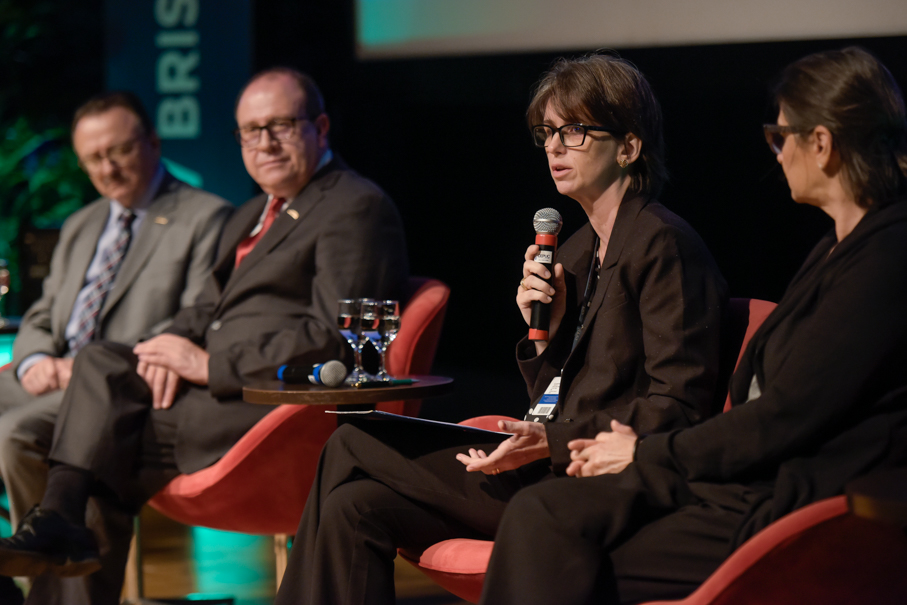Event featured US researcher Courtney Soderberg, from Center for Open Science

Vice President of Research and Graduate Studies, Dr Carla Bonan, at the opening of the event | Images: Bruno Todeschini
The 5th Brazilian Congress of Research Integrity and Ethics in Science and Publication (Brispe) brought together researchers and students from several academic areas on Oct 25-26. This edition of the event, organized by the Office of the Vice President for Research and Graduate Studies (Propesq), focused on Research Integrity and Reliability of Research Records: The Role of Graduate Programs.
In the opening ceremony, the President Br. Dr Evilázio Teixeira discussed the relevance of the event. “Integrity, reliability and ethics are of utmost importance for a variety of reasons: discussions concerning the resources available for research in Brazil, the maintenance of graduate programs at universities, the relevance of the scientific production of Brazil and the reliability of information”, adds he. In the President’s view, the relevance of research and the role of universities, as never before, will be assessed in view of their ability in responding to the major problems of society concretely.
The Vice President of Propesq and president of the 5th Brispe, Dr Carla Bonan, reaffirmed the commitment to the quality of research developed at PUCRS and the need to adjust the practices to the complexity research has taken on recently. She claims that PUCRS is very proud to be hosting the 5th Brispe, years after it hosted its second edition. “It means a lot to us, in our 70th anniversary, to be hosting the 5th Brispe, especially as we are trying to strengthen and improve the reliability of science in Brazil in every area, with the direct involvement of our graduate students, their advisors and mentors”, completes she.
Open research, integrity and research reproducibility
The session Practical measures to increase transparency and reproducibility in research, was delivered by Courtney Soderberg, of the Center for Open Science (USA), a non profit technology organization intended to consolidate the idea of open research, the integrity and reproducibility of scientific research.
At the event, Courtney addressed the gradual increase in the number of inaccurate investigations in different areas. In her view, it is generally difficult to reproduce the findings of research carried out in different areas.
As researchers go a long way from starting their research until they publish it, a lot of information gets lost, even by the researchers themselves. “And why do we need to care about this difficulty in reproducing what we are going through? Because this stops science, impedes the design of new investigations on previous research and also because resources are spent unnecessarily”, points she.
Good practices in evidence
As alternatives to increase research transparency, the US researcher’s suggestions include both small everyday actions of organization and structural changes to the analyses. In practical terms, she presented the benefits of creating a structure of work and the advantages to plan research management. This plan may include checklists, the designing of dedicated forms or specific systems to organize and store data.
Besides, Courtney addressed the research’s preliminary records, which include what the researcher intends to study and the method chosen. This allows other investigators to see where they can find ongoing works in the area of interest. This is very useful for collaborative research, too.
Lastly, she talked about the importance of giving the analysis data a careful treatment so that they can be reproduced in the future or open the doors to deeper investigations. She made a point to the advantages of sharing data and analyses as a continuous development strategy.
Although not all of her suggestions can be put in practice in all types of studies, the lecturer re-stated the importance of minor changes in her routine as valuable for science as a whole. “Minor changes to the organization and the implementation of the concept of open science as well as group meetings and improvements to some methodology procedures can make a difference in the transparency and reproducibility of findings”, adds she.